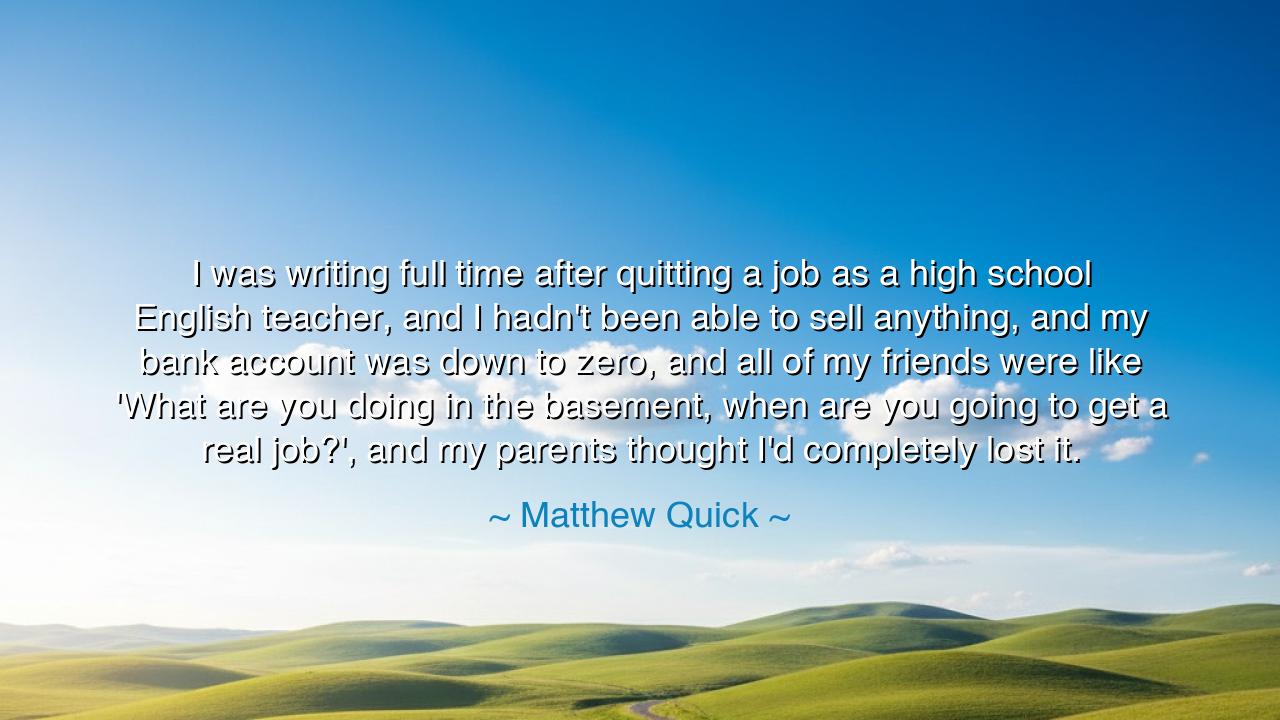
I was writing full time after quitting a job as a high school
I was writing full time after quitting a job as a high school English teacher, and I hadn't been able to sell anything, and my bank account was down to zero, and all of my friends were like 'What are you doing in the basement, when are you going to get a real job?', and my parents thought I'd completely lost it.






Matthew Quick once recalled: “I was writing full time after quitting a job as a high school English teacher, and I hadn’t been able to sell anything, and my bank account was down to zero, and all of my friends were like ‘What are you doing in the basement, when are you going to get a real job?’, and my parents thought I’d completely lost it.” These words, though spoken of his own struggle, resound as an anthem for every soul who has dared to follow a vision unseen by others. They capture the solitude of the dreamer, the humiliation of the misunderstood, and the fierce persistence required when the world calls one a fool for daring to believe.
To quit the safety of a job, especially the noble work of teaching, in order to embrace the uncertainty of writing, is to cast oneself into the wilderness of fate. Quick paints the image of the basement, a place dark, hidden, beneath the world’s notice. Yet in that darkness, a seed was being watered—the seed of stories that would one day emerge as The Silver Linings Playbook and other works that touched millions. What seemed to others like madness was in truth an apprenticeship of the soul, a season of testing in obscurity before the harvest of recognition.
The ancients knew such trials well. Consider the story of Demosthenes, the Athenian orator. As a boy, mocked for his stammer, he retreated not to a basement but to the seashore, placing pebbles in his mouth and shouting over the roar of the waves to strengthen his voice. His friends and neighbors must have thought him mad, yet through persistence he became one of the greatest speakers of Greece. Like Quick, he endured the laughter of others, the doubts of family, the scorn of society—but he held fast, and by so doing, transformed weakness into triumph.
Quick’s words about an empty bank account are not just about money but about the stripping away of all worldly assurances. When nothing remains—when savings are gone, when approval has fled, when even parents despair of you—then only the inner fire can sustain you. It is the crucible of every creator, where the soul must decide: shall I abandon the dream for comfort, or endure the storm until destiny takes shape? In the basement, Quick chose endurance, and that choice made possible the light that later filled his books and films.
There is also a universal wound revealed in his words: the sting of being told to get a “real job.” Society often scorns the labor of the heart, because it cannot measure it in wages or see its fruit immediately. Yet the greatest contributions to humanity—poetry, art, philosophy, discovery—were born from those who endured this same mockery. Van Gogh died poor, his work unsold, yet his vision reshaped the world of art. Galileo was scorned, yet his truths became the foundation of modern science. The voice of doubt is always loudest before the moment of transformation.
The lesson, then, is clear: trust the call that burns within you, even when the world ridicules it. If you are in your own basement, laboring unseen, remember that greatness is forged in hidden places. Do not despise small beginnings, nor let empty pockets convince you that your dream is worthless. What appears as failure may be the necessary preparation for triumph, if only you persist.
Practical action flows from this truth. If you feel torn between security and calling, make time each day to nurture your true work, even if unseen. Set aside hours, however small, to labor in faith. Surround yourself with even one or two who believe in your vision, for the chorus of doubt is strong. And when discouragement comes—as it always will—recall the words of Quick: that even in zero balance and ridicule, the path of persistence can lead to creation that outlasts despair.
Thus, Quick’s testimony becomes more than a story of a writer—it becomes a parable of courage. His basement was not a prison but a sanctuary, his poverty not the end but the soil of perseverance, his madness not folly but vision. Let his words be carried forward: when the world tells you you’ve lost it, you may in truth be on the very path to finding yourself.






AAdministratorAdministrator
Welcome, honored guests. Please leave a comment, we will respond soon